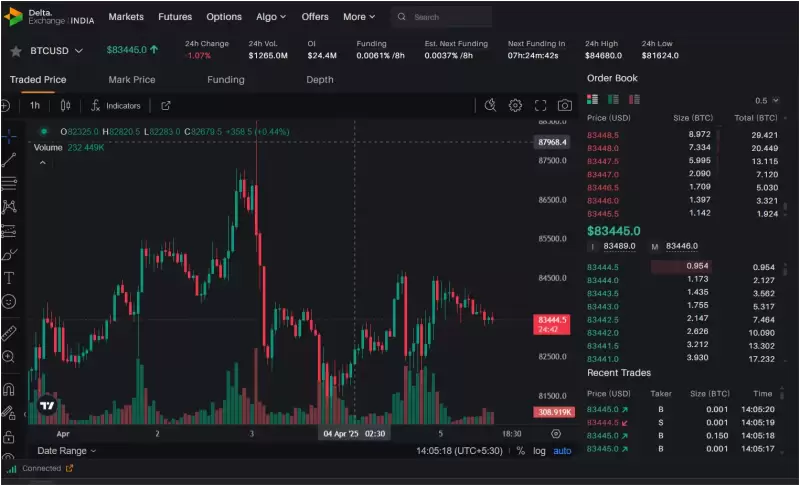 |
|
 |
|
 |
|
 |
|
 |
|
 |
|
 |
|
 |
|
 |
|
 |
|
 |
|
 |
|
 |
|
 |
|
 |
|
Cryptocurrency News Articles
Bitcoin Mining Emits Harmful Air Pollutants that Spread Across States: Study Reveals
Apr 15, 2025 at 05:17 am
A newly published peer-reviewed study has raised alarms over the environmental and public health impact of Bitcoin mining in the U.S.

A newly published peer-reviewed study has sounded the alarm over the environmental and public health impact of Bitcoin mining in the U.S., with a focus on the major facilities and the spread of dangerous fine particulate matter (PM2.5).
According to the research in Nature Communications, emissions from these large-scale mining operations travel far beyond their local environment and ultimately harm millions of Americans in distant states with a key focus on new study in Nature Communications examines the environmental burden of the U.S. bitcoin mining boom. Published on March 26, the study titled “The environmental burden of the United States’ bitcoin mining boom” was led by Dr. Francesca Dominici of Harvard’s T.H. Chan School of Public Health.
The study analyzed the top 34 Bitcoin data mining facilities in the U.S. between August 2022 and July 2023, examining their energy consumption, primary energy mix, and spatial footprint.
These 34 facilities, which together process nearly 40% of Bitcoin’s total hash rate, are powered by an average energy mix of 67% fossil fuels, 26% nuclear, 5% hydro, and 2% renewables.
The researchers used a state-of-the-art atmospheric model to estimate the impact of these facilities’ emissions on ambient PM2.5 concentrations across the U.S. Their findings show that this mining activity is exposing an estimated 1.9 million Americans to elevated levels of PM2.5.
Key Takeaways:
* A new study in Nature Communications examines the environmental burden of the U.S. bitcoin mining boom.
* The research, led by Dr. Francesca Dominici of Harvard’s T.H. Chan School of Public Health, analyzed the top 34 Bitcoin data mining facilities in the U.S. between August 2022 and July 2023.
* These facilities, which together process nearly 40% of Bitcoin’s total hash rate, are powered by an average energy mix of 67% fossil fuels, 26% nuclear, 5% hydro, and 2% renewables.
* As a result of this mining activity, researchers estimate that 1.9 million Americans are being exposed to ≥0.5 μg/m³ of additional PM2.5—a key air pollutant—over the course of a year.
* This exposure is largely concentrated in New York City, the Houston/Austin corridor, northeast Texas, and parts of the Illinois/Kentucky border, where residents face the greatest impact from Bitcoin mining.
* A glaring regulatory blind spot emerges as a consequence, highlighting how state governments lack the authority to regulate pollution originating from out-of-state activities.
* To mitigate this issue, the study suggests the U.S. Environmental Protection Agency (EPA) could introduce a “Good Neighbor” rule, requiring upwind states to more aggressively curtail power plant emissions.
* This would in turn reduce downstream pollution in downwind states, ultimately lessening the health burden on millions of Americans.
The researchers, who used a state-of-the-art atmospheric model to quantify the impact of these facilities’ emissions on ambient PM2.5 concentrations across the U.S., estimated that this mining activity is exposing an estimated 1.9 million Americans to elevated levels of PM2.5.
This exposure is largely concentrated in New York City, the Houston/Austin corridor, northeast Texas, and parts of the Illinois/Kentucky border, where residents are facing the greatest impact from Bitcoin mining.
However, a glaring regulatory blind spot emerges as a consequence.
The report notes that state governments currently lack the authority to regulate pollution that originates from out-of-state activities.
This poses a significant obstacle, as the study found that, for instance, residents in Metropolis, Illinois, are being exposed to PM2.5 emissions from a power plant in Kentucky, which in turn supports a Bitcoin mine in North Carolina.
In order to mitigate this issue, the study suggests the U.S. Environmental Protection Agency (EPA) could introduce a “Good Neighbor” rule.
This rule would require upwind states to more aggressively curtail power plant emissions, which would in turn reduce downstream pollution in downwind states and ultimately lessen the health burden on millions of Americans.
The study also delves into the economic implications of Bitcoin mining in the U.S.
It highlights the significant role of the government in supporting this industry through tax breaks and subsidies for clean energy technologies.
Moreover, the researchers note that despite the industry’s claims of being rapidly adopting sustainable energy sources, the pace of this transition may be slower than anticipated due to the timelag in reporting and processing data from new mining facilities.
This finding is critical for understanding the true scope of the industry’s environmental footprint and the urgency needed in shifting towards more sustainable practices.
Disclaimer:info@kdj.com
The information provided is not trading advice. kdj.com does not assume any responsibility for any investments made based on the information provided in this article. Cryptocurrencies are highly volatile and it is highly recommended that you invest with caution after thorough research!
If you believe that the content used on this website infringes your copyright, please contact us immediately (info@kdj.com) and we will delete it promptly.
-

-

-

-

-

- One of the Most Significant Catalysts for a Cryptocurrency's Growth and Mainstream Adoption Is the Introduction of an Exchange-Traded Fund (ETF)
- Apr 16, 2025 at 11:30 pm
- This combination of potential ETF approvals and innovation in blockchain scalability points to a rapidly evolving landscape. While established names like XRP and Solana may offer stability and slower growth
-

- As Ethereum (ETH), Cardano (ADA), and Rexas Finance (RXS) show themselves as viable rivals for significant price increases, the cryptocurrency market is heating up.
- Apr 16, 2025 at 11:30 pm
- With a market capitalization of $248.7 billion and a 120 million coin circulating count, Ethereum remains the major player in decentralized finance (DeFi).
-

-

-

- One of South Korean presidential candidates, Hong Joon-pyo, has disclosed that he intends to take a similar stance to Trump’s policies on crypto regulations.
- Apr 16, 2025 at 11:20 pm
- Hong, who is currently vying to be the presidential candidate for South Korean right-wing party, People Power Party (PPP) announced that he will also make changes in disruptive technologies like AI, superconductors and quantum technology.




























































